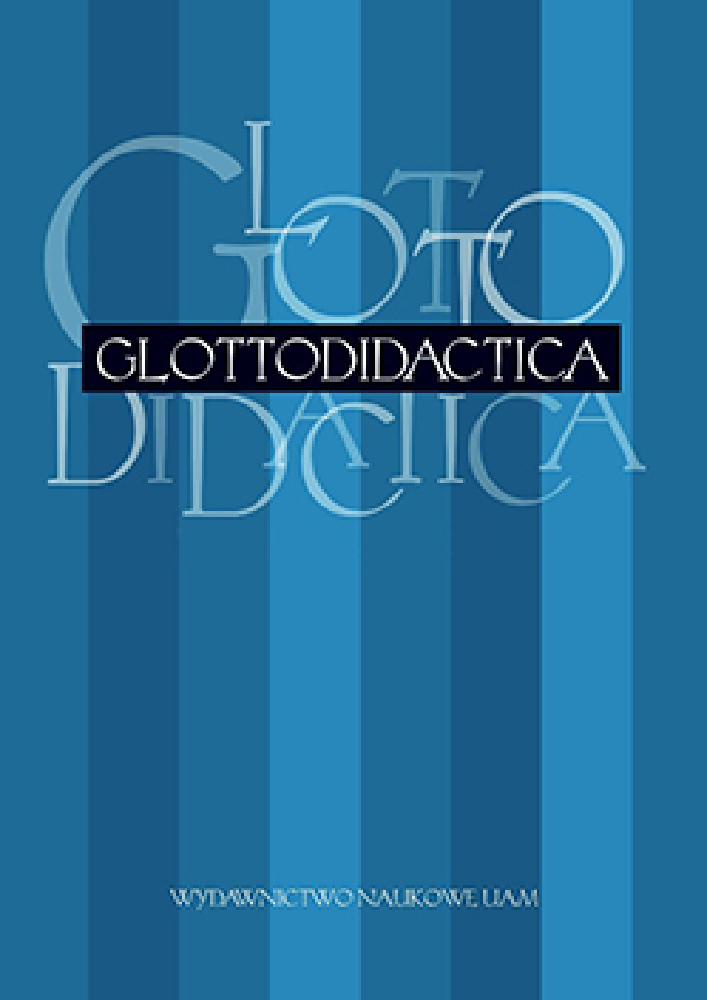Résumé
The paper is a reflection on the development of academic literacy skills in French and Polish while writing a diploma paper in glottodidactics by Polish third year ethnolinguistics students. The first part of the paper focuses on a diploma paper in glottodidactics as an important component of philological education at Adam Mickiewicz University in Poznań. Next, the author analyses the concept of epistemological consciousness and its impact on the development of student autonomy during the acquisition of glottodidactic discourse and glottodidactic knowledge as a specialist knowledge which they gain. The author’s conception, referring to writing research papers in line with the principles of glottodidactics as a research field, is based on the assumption that students should become aware of the epistemological specifics of glottodidactics and include them both in the form and the content of their diploma papers. Finally, the author discusses various stages in the development of students’ epistemological consciousness and looks into the processesthe supervisor needs to engage in for effective research supervision.
Références
Blanchet, Ph. / Coste, D. (2010). Regards critiques sur la notion d’interculturalité. Pour une didactique de la pluralité linguistique et culturelle. Paris: L’Harmatton.
Chłopek, Z. (2011). Nabywanie języków trzecich i kolejnych oraz wielojęzyczność. Aspekty psycholingwistyczne (i inne). Wrocław: Wydawnictwo Uniwersytetu Wrocławskiego.
Coste, D. / North, B. / Sheil, J. / Trim, J. (2001). Cadre européen commun de référence pour les langues: apprendre, enseigner, évaluer. Paris: Conseil de l’Europe / Didier.
Dakowska, M. (2003). Current controversies in foreign language didactics. Warszawa: Wydawnictwo Uniwersytetu Warszawskiego.
Dakowska, M. (2014). O rozwoju dydaktyki języków obcych jako dyscypliny naukowej. Warszawa: Wydawnictwo Uniwersytetu Warszawskiego. DOI: https://doi.org/10.31338/uw.9788323514121
Galisson, R. (1986). Éloge de la Didactologie / Didactique des Langues et des Cultures (maternelles et étrangères) – D/DLC. Études de Linguistique Appliquée, 64, 97–110.
Galisson, R. (1990). Où va la didactique du français langue étrangère ? In: R. Galisson (dir.). De la linguistique appliquée à la didactologie des langues-cultures: vingt qns de réflexion. Études de Linguistique Appliquée. Revue de didactologie des langues-cultures, 79, 9–28.
Galisson, R. (2002). Didactologie: de l’éducation aux langues-cultures à l’éducation par les langues-cultures. Études de Linguistique Appliquée, 128, 497–510. DOI: https://doi.org/10.3917/ela.128.0497
Mangenot, F., Zourou, K. (2007). Susciter le dialogue interculturel en ligne. Rôle et limites des tâches. Lidil, 35, 43–68. DOI: https://doi.org/10.4000/lidil.2413
Nijakowska, J. (dir.). 2009. Perspektywy i wyzwania w studiach nad przyswajaniem języka obcego. Łódź: Wydawnictwo Uniwersytetu Łódzkiego.
North, B. / Goodier, T. / Piccardo, E. (2018). Cadre européen commun de référence pour les langues: apprendre, enseigner, évaluer. Volume complémentaire avec de nouveaux descripteurs. Conseil de l’Europe.
Orchowska, I. (2007). La formation interculturelle des futurs enseignants de FLE dans le contexte universitaire polonais. Kraków: Flair.
Orchowska, I. (2014a). Approche interculturelle et spécificité épistémologique de la didactologie des langues et cultures étrangères. In: E. Wąsikiewicz-Firlej / H. A. Lankiewicz / A. Szczepaniak-Kozak (dir.). Culture and creativity in discourse studies and foreign language pedagogy (pp. 25–38). Piła: Wydawnictwo PWSZ im. S. Staszica w Pile.
Orchowska, I. (2014b). De l’autonomie scientifique de la didactologie des langues étrangères en Pologne. L’analyse comparative des conceptions de trois épistémologues contemporains polonais de la discipline. In: J. I. Ignacio Aguilar Río / C. Brudermann / M. Leclère (dir.). Complexité, diversité et spécificité : Pratiques didactiques en contexte (pp. 181–195). Paris: Université Sorbonne Nouvelle – Paris 3.
Valdman, A. (2003). The acquisition of sociostylistic and sociopragmatic variation by instructed second language learners: the elaboration of pedagogical norms. In: C. Blyth (dir.), The sociolinguistics of foreign-language classroom: Contribution of the native, the near-native, and the non-native speaker (pp. 57–78). Boston: Heinle.
Wilczyńska, W. (1999). Uczyć się czy być nauczanym? O autonomii w przyswajaniu języka obcego. Warszawa / Poznań: PWN.
Wilczyńska, W. (2010). Introduction à la didactique du FLE. Kraków: Flair.
Wilczyńska, W. / Michońska-Stadnik, A. (2010). Metodologia badań w glottodydaktyce. Wprowadzenie. Kraków: Flair.
RÉSEAUGRAPHIE
Blanchet, P. (2009). Contextualisation didactique: de quoi parle-t-on ?. Le français à l’université. http://eprints.aidenligne-francais- universite.auf.org/147/1/pdf.pdf [access: 11.03.2020].
Charaudeau, P. (1988). L’interculturel, une histoire de fou. Dialogues et cultures 32. http://www.patrick-charaudeau.com/L-interculturel-une-histoire-de,114.html [access: 11.03.2020].
Charaudeau, P. (2010). Pour une interdisciplinarité ‘focalisée’ dans les sciences humaines et sociales. Questions de communications. http://questionsdecommunication.revues.org/385 [access: 11.03.2020]. DOI: https://doi.org/10.4000/questionsdecommunication.385
Licence
© Izabela Orchowska 2020

Ce travail est disponible sous licence Creative Commons Attribution - Pas de Modification 4.0 International.
Auteurs
Les auteurs de textes acceptés pour publication dans la revue Glottodidactica sont tenus de remplir, signer et renvoyer à l'adresse de la rédaction, un accord sur l'octroi d'une licence gratuite pour les œuvres, avec obligation d'accorder une sous-licence CC.
Conformément à cet accord, les auteurs des textes publiés dans la revue Glottodidactica accordent à l'Université Adam Mickiewicz de Poznań une licence non exclusive et gratuite et autorisent l'utilisation de la sous-licence Creative Commons Attribution-NoDerivatives 4.0 International (CC BY-ND 4.0).
Les auteurs se réservent le droit de disposer librement de l'œuvre.
Utilisateurs
Les utilisateurs d'Internet intéressés ont le droit d'utiliser les œuvres publiées dans la revue Glottodidactica depuis 2016, selon les conditions suivantes :
- Attribution – obligation de fournir, conjointement avec l'œuvre distribuée, des informations sur l'auteur, le titre, la source (lien vers l'œuvre originale, DOI) et la licence elle-même.
- Aucune modification – l'œuvre doit être préservée dans sa forme originale. Sans le consentement de l'auteur, il n'est pas possible de distribuer l'œuvre modifiée sous forme de traductions, publications, etc.
Les droits d'auteur sont réservés pour tous les textes publiés avant 2016.
Autres
L'Université Adam Mickiewicz de Poznań conserve les droits sur la revue dans son ensemble (mise en page, forme graphique, titre, conception de la couverture, logo, etc.).
A PARTIR DE L’ANNEE 2015, LES ARTICLES PUBLIÉS DANS LA REVUE SONT DISPONIBLES SOUS LICENCE CREATIVE COMMONS : https://creativecommons.org/licenses/by-nd/4.0/deed.fr





